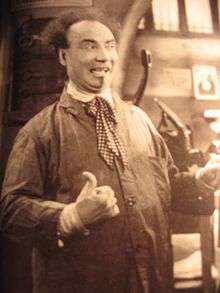Angelo Musco (actor)
Angelo Musco (October 18, 1872 – October 6, 1937) was an Italian actor in theater and film. He was known for his comic abilities as well as for his carefully drawn psychological portraits.
Angelo Musco | |
|---|---|
 Musco in Fiat voluntas Dei (1936) | |
| Born | October 18, 1872 |
| Died | October 6, 1937 (aged 64) |
Born in Catania, Sicily to a Maltese father and a Sicilian mother,[1] Musco worked at a number of menial, odd jobs in his youth, spending time as a barber, a shoemaker, and a mason. He broke into theatrical work by finding employment with the Opera dei Pupi, the local marionette theater. In 1899 he joined the theatrical company of Giovanni Grasso, whose actors performed only in the Sicilian language.
In 1902 Musco began a collaboration with Nino Martoglio, who had seen him in Rome in Malia of Luigi Capuana and I Mafiusi of Giuseppe Rizzotto and Gaetano Mosca. Martoglio became director of Musco's company in 1907, and wrote for him the plays San Giovanni decollatu and L'aria del continente. Musco also collaborated with Pier Maria Rosso di San Secondo, author of the play Madre, and he worked with Marinella Bragaglia and Rosina Anselmi. He also founded his own theater company, supported by the critic Renato Simoni and by Luigi Pirandello. The latter wrote a number of comedies for him to play, including Il berretto a sonagli (which he played in Rome), Liolà, and Pensaci, Giacomino!. This last was filmed with Musco in the lead role; his cinematic career had begun in 1932 and was a great success.
Musco died suddenly in Milan in 1936, immediately after a performance. He was the subject of a documentary directed by Giorgio Walter Chili in 1953, C'era una volta Angelo Musco.
Filmography
- Five to Nil (1932)
- The Matchmaker (1934)
- L'eredita dello zio buonanima (1934)
- God's Will Be Done (1936)
- The Amnesiac (1936)
- King of Diamonds (1936)
- L'aria del continente (1936)
- Pensaci, Giacomino! (1937)
- Gatta ci cova (1937)
- The Ferocious Saladin (1937)
Bibliography
- S. Zappulla Muscarà, E. Zappulla, Musco: immagini di un attore Catania, Giuseppe Maimone editore, 1987, ISBN 8877510137.
- E. Zappulla Angelo Musco e il teatro del suo tempo Catania, Giuseppe Maimone editore, 1991, ISBN 8877510471.
References
- Roberto Chiti (2003). Dizionario del cinema italiano: Gli attori dal 1930 ai giorni nostri. Gremese Editore. Retrieved April 15, 2015.